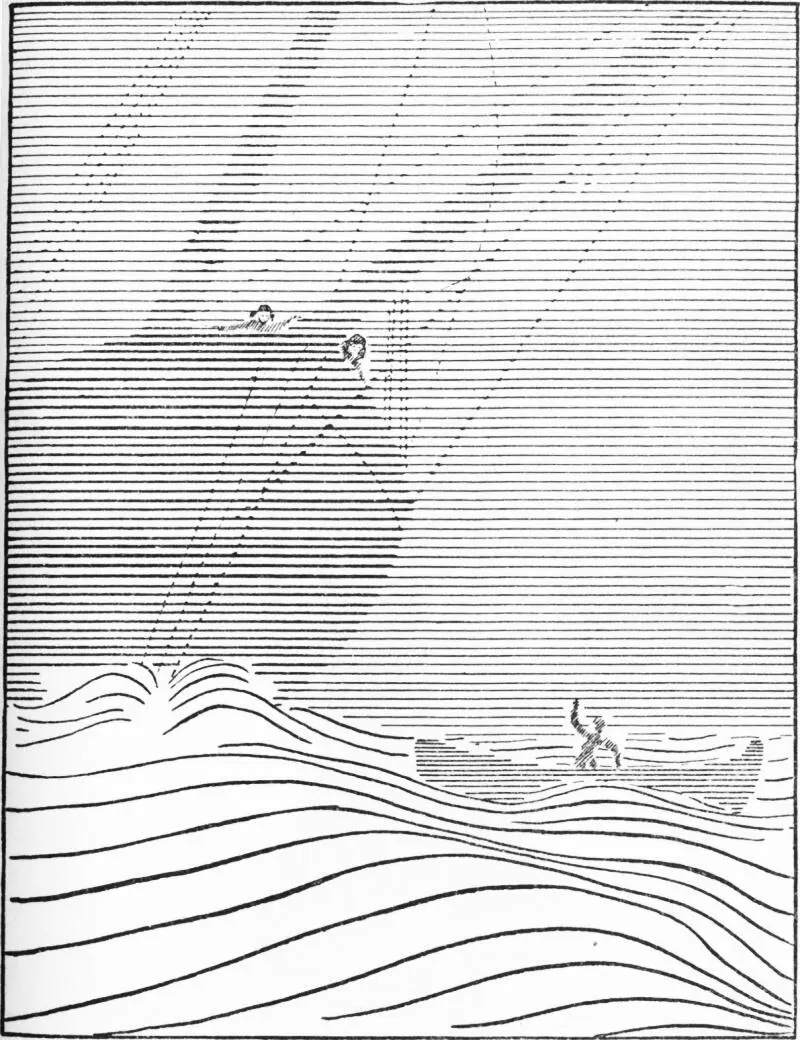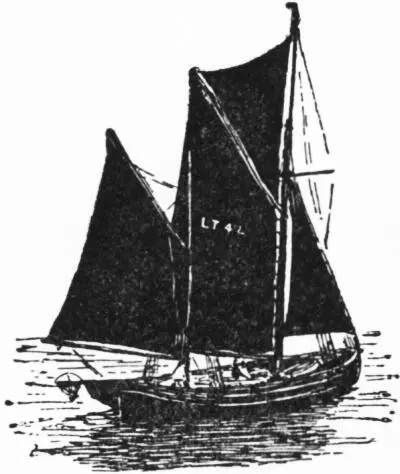“Them,” Titty whispered to herself. “It must be them.”
Everybody except Peter Duck was peering away into the fog. Peter Duck was looking at nothing but the compass card inside the deckhouse window. He leaned forward and wiped the window with a red and green speckled handkerchief.
And then that same short blast on a foghorn sounded ahead of the Wild Cat, as it had sounded before.
Everybody stared forward, except Peter Duck. Peter Duck stuffed his speckled handkerchief into his pocket and went on watching the compass card, keeping a firm, steady grip on the wheel.
“Was that the Viper, or wasn’t it?” whispered Captain Flint.
“We’ll soon know,” whispered Peter Duck. “Still bearing south, that foghorn of his.”
“If it wasn’t them, who was it?” thought Titty, and Captain Flint and everybody else aboard was thinking the same thing, except perhaps Peter Duck, for whom nothing seemed to matter but the compass card inside the deckhouse window.
The deep booming of an Atlantic liner’s siren startled them.
“Far enough,” whispered Peter Duck, “and her course is a long way south of this. She’ll be ten miles west of the Scillies before we cross her wake.”
Again, and nearer now, came the single hoot on exactly the note of the horn they had heard from the Viper soon after the fog had rolled over her and hidden her.
“Still south?” asked Captain Flint, who had slipped into the deckhouse for a moment, to look at the chart, and now came out again after seeing for himself that Peter Duck was right and that they had nothing to fear from the liner.
“South,” said Peter Duck. “If she’s been sailing all this time on the starboard tack she must have got an anchor out over her stern. Stand by, sir, now, with that big foghorn of ours, the bull-roarer, not that Board of Trade toy.”
Captain Flint brought the big foghorn out again, and rested it on the roof of the deckhouse.
Again there was the hoot of a foghorn, close ahead of them.
“Let fly now, sir,” said Peter Duck. “Three blasts to stir old Davy out of his bed.”
Captain Flint took a long breath, set his mouth to the bull-roarer and let fly, and if Davy Jones had been sleeping anywhere within a mile or so, the noise would surely have tumbled him off his locker. It was a long, tremendous roar, so loud that Titty was almost deafened by it, and Nancy, who was by the door of the galley and had not seen what was going on behind her, looked as startled as if an Atlantic liner were at that moment looming over them out of the fog. Peggy and Roger were startled almost into squeaking, though they instantly hushed each other. Susan and John, up in the bows, turned round wondering what was happening, just as Captain Flint, taking a second long breath, let fly again.
Before his second blast was finished, they heard the foghorn ahead of them. Weak, plaintive it seemed after that tremendous roar. It sounded this time not a single short blast, but one after another, in quick succession, as if it were afraid to stop.
Captain Flint let fly for the third time.
The other foghorn hooted desperately now from close under the very bows of the Wild Cat.
Titty saw Captain Flint look questioningly at Mr. Duck. Mr. Duck did not stir.
Suddenly there was a yell from John.
“Boat right ahead! On the port bow.”
“Guessed as much,” said Mr. Duck.
There was a wild scream, from close under the bowsprit as it seemed to Titty and the others in the stern. But they saw Susan running aft along the port side.
“Throw him a rope,” she cried. “Quick! Quick!”
Everybody hurried to the port bulwarks. Drifting by close under the Wild Cat was a small ship’s gig, tarred black. In it was a smallish boy clutching a mechanical foghorn, and looking up with terrified eyes at the Wild Cat gliding past him and at the faces looking down at him over her rail.
“Catch,” called Captain Flint, picking up the loose end of the mainsheet, which was hanging in loose coils on a belaying-pin in the rail, and dropping it neatly across the boat as it slipped by.
 RUN DOWN IN THE FOG
RUN DOWN IN THE FOG
The boy did not hesitate. He dropped the foghorn, grabbed the rope as high as he could reach, threw himself clear of the boat, and scrambled up. In another moment Captain Flint was hauling him over the rail, while the boat, empty except for the foghorn, drifted away into the fog and disappeared astern.
The boy, trembling all over, stood on the deck, looking round him and holding to the bulwarks.
“Why, it’s Bill,” said Peter Duck.
“It’s the red-haired boy,” said Titty.
The boy’s wet red face broke into a smile.
“Come aboard, I have, Mr. Duck.”

Table of Contents
“Barbecued billygoats,” cried Captain Nancy, “but . . .”
Peter Duck interrupted.
“Sound carries in a fog, Cap’n Nancy,” he said, “and we’ve made enough noise already, what with shouting and getting him aboard. Cap’n John, I’m ashamed of you. What’s the look out doing, hanging round the poop? Mate Peggy, I thought you was amidships. Mate Susan, wasn’t you up on the foredeck with Cap’n John? Tidy mess it seems to me with the whole crew aft. Time enough we’ll have to settle with Bill when we’re farther out of this. Cap’n Flint, sir, would you mind now giving another three blasts on that bull-roarer? Just in case they’re listening for it in the Viper. I wouldn’t like to set them wondering too soon why they only heard it once. Three blasts, sir, as before.”
Captain Flint leaned forward again over the deckhouse roof and blew three more great blasts on the old horn.
“Oo,” said Bill. “Sounds better like this than it does when you hears it coming down on you out o’ the fog. I thought I was a goner just now.”
“Less lip,” said Peter Duck. “We ain’t begun to think of you yet. And why hain’t you coiled the mainsheet as you come aboard by? No. Begin at the right end, where it’s made fast. You ought to know as much as that.”
Everybody had hurried back, each to his post.
“And what now, Mr. Duck?” said Captain Flint.
“That’s for you to say, sir,” said Peter Duck. “Maybe we ought to pick up that little dinghy and go and look for Black Jake to give it him back and his cabin-boy as well. He’d be sorry to lose that little boat, and the foghorn too. . . .”
“I’ll see him fried first,” said Captain Flint, and there was a laugh, instantly choked, from Nancy, who was near enough to hear.
“I’d rather stay,” said Bill.
“You wasn’t asked,” said Peter Duck.
“I’m only sorry we didn’t sink the boat,” said Captain Flint. “He may find her again when the fog lifts.”
“Then we’d better be shifting,” said Peter Duck. “Fog may last an hour or two yet, or it may not. But the wind’s nor’-westerly, right enough, and that’s a grand wind for Spain. Sou’west by south and a half south’s the course, to put us outside Cape Villano coming from the Longships. And topsails would help her along.”
Just then the liner’s siren sounded, and Captain Flint reached for the bull-roarer.
“No,” said Peter Duck. “We’re a different vessel altogether. We’re not that one with a bull-roarer, no, nor yet the Wild Cat that had nothing but a dinner-bell to clatter on, the vessel Black Jake’s seeking away there between Land’s End and the Seven Stones. We’ll sound on the Board of Trade horn if we sound anything, but it don’t matter for a bit if we do keep quiet.”
Читать дальше

 RUN DOWN IN THE FOG
RUN DOWN IN THE FOG











